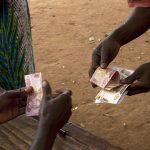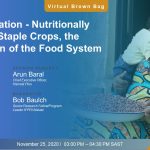Flooding and prolonged dry spells are detrimental to agriculture and food security. In a country like Malawi, where people rely heavily on agriculture for their livelihoods, interventions to help the most stressed households that suffer from agricultural production shocks are often necessary. For a period in 2016/17, Malawi faced a drought-induced food security emergency which […]
Event recap: Biofortification – Nutritionally Enriched Staple Crops, the Foundation of the Food System
Event recap IFPRI Malawi virtual brown bag seminar November 25, 2020. Presented by Lynn Brown and Dellings Phiri with opening remarks by Arun Baral.
Event recap: Do cash+ interventions enable improved resilience and dietary diversity in southern Malawi?
Event recap IFPRI Malawi virtual brown bag seminar Nov 12, 2020 presented by Esther Mweso, Luciano Msunga, and Carlota Rego.
Malawi’s Population: Demographic Dividend or Curse? A commentary on the NSO’s latest population projections
This commentary on the NSO’s latest population projections was written by Bob Baulch and Grace Kumchulesi.
Investing in nutrition through early childhood development in Malawi: Assessing costs and benefits
The Strengthening Economic Evaluation for Multisectoral Nutrition Strategies (SEEMS-Nutrition) initiative offers a set of tools for project evaluations.
- « Previous Page
- 1
- …
- 15
- 16
- 17
- 18
- 19
- …
- 23
- Next Page »





